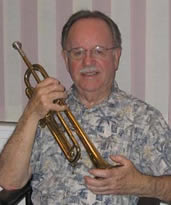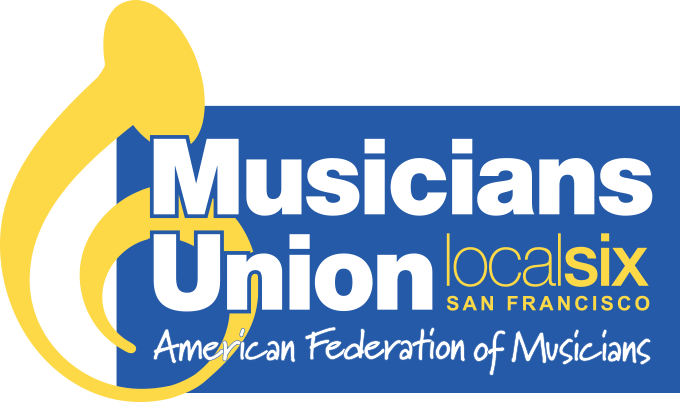 “I Owe a lot to music. I love it, and I’d do it again.” Wayne Allen, a professional trumpet player, lived through the Golden Age of live music in San Francisco. Here is his story:
“I Owe a lot to music. I love it, and I’d do it again.” Wayne Allen, a professional trumpet player, lived through the Golden Age of live music in San Francisco. Here is his story:
Wayne Allen was born in San Francisco in 1927. He went to McKinley Grammar School, Everett Junior High, and then Lowell High School. He knew he wanted to be a trumpet player at a very young age. When Wayne was a child, his family spent summer vacations in the Russian River resort area, a popular stop for traveling dance bands. One night, peeking through a window into the dance hall from an adjacent café, Wayne saw Sonny Dunham playing the trumpet with his band. He can’t explain why, but he was hooked.
A few years later, Wayne made sure he would be chosen to play trumpet in the junior high school band by asking his father to get him a trumpet to practice on. Wayne says in those days the teacher would decide what instrument you were to play by how natural you looked holding it. Wayne’s enthusiasm got him the job. In those formative years he played in the school marching band, performed in concerts, parades, and even played at the 1939 World’s Fair on Treasure Island.
Wayne’s first professional job was at the Warfield theatre when he was 17. Kids were given these opportunities because many musicians were off fighting in WWII. When Wayne brought home the idea of playing music professionally, his parents were not happy — they wanted him to get an education. Wayne’s father, a San Francisco firefighter, had been forced to quit school at an early age to help support his family after his father died. He was adamant that Wayne stay in school. Eventually, Mr. Krieger, Wayne’s music teacher at Lowell High, convinced Wayne’s parents that Wayne had a real talent and could make money with music. He arranged Wayne’s school schedule so he was out of class by noon and able to catch the Hayes street cable car downtown for the 1 o’clock show. The Warfield presented four one hour vaudeville shows a day. Because he worked nights, Wayne had a hard time making it to school on time. On those rare occasions when he did, his home room would break into applause.
Wayne says his music career could have ended right there if his parents had not supported his decision because playing in the band at the Warfield gave him the practical experience and opportunity to make business contacts with other players.
After graduating from high school Wayne enlisted in the army. The war was over, but the draft was still in existence. Wayne’s father used his connections to get Wayne into band school, located in Richmond, Virginia. Wayne was stationed there for basic training but was accidentally assigned to cooking school, not band school. Eventually, Wayne went on to band school and was assigned to Fort Lewis, WA, where he played in the band and earned his sergeant stripes by recording bugle calls.
After 18 months in the army, Wayne came back to San Francisco where he established himself as a theatre musician. He also went to San Francisco State under the G.I. Bill where he received his B.A. and teaching credentials in music. Wayne was interested in accounting as an alternative to the music business, but after a little research he realized he could make more money playing music, so he quit the program.
In 1951, Wayne went on the road for two years with a full Broadway show. He had the time of his life traveling by train and seeing America. He also toured with Betty Hutton, and Danny Kaye.
Back in San Francisco Wayne played theatres, trade shows, radio broadcasts, and the occasional odd gig. “In those days,” Wayne recalls,”Everyone would go down to the union to pick up jobs.” During that period Wayne went on the road briefly for Westinghouse (corporations at that time utilized full Broadway productions to announce their new products) and played in the NBC radio orchestra, which also went on short tours. Wayne says his only claim to fame was the recording he did with the McGuire Sisters, who were on the Arthur Godfrey Show at the time, of Around The World. He did all the solo trumpet work on the recording.
In 1958, Wayne was hired at Bimbo’s, one of San Francisco’s premiere nightclubs which boasted big production numbers complete with chorus lines. He worked six nights a week, 7pm – 2am, three shows a night. During the day he continued to work trade shows, Chinese funerals, and the Muni band, among other things. “I was playing 8-10 hours a day, and making good money. I loved it,” explains Wayne. It was during this time that he met his wife, a chorus girl at the now defunct Gay Nineties club. They married in 1959.
Wayne worked at Bimbo’s for thirteen years, until it closed. “I closed a lot of places,” recalls Wayne. By that time the night club industry had changed. Big production numbers were out, rock music was in. Wayne returned to the theatre, which was still very active.
In 1972, he went on tour with Liberace, which widened his horizons.
“Liberace was a wonderful guy; he always took his musicians with him wherever he went, even to large banquets,” recalls Wayne,”And he always ordered something interesting and different. Whenever the waiter would take my order I’d say, ‘I’ll have the same as Mr. Liberace, please’. That’s the first time I had veal with artichokes. I loved it.”
Wayne worked for Liberace for two years, flying all over the country as needed, most notably for the opening of Disney World in Florida. Afterwards, Wayne returned to local theatre work. Soon after, he was offered the contractor position for the Curran theatre, where he utilized his accounting skills. “At times it was hard to get some of the players I wanted,” recalls Wayne,” They were making so much money on casual gigs that they didn’t want to be locked into an eight week theatre run.”
Wayne remembers when the first national tour of “A Chorus Line” came to San Francisco and played the Curran theatre. “The producers wanted to put a cover over the orchestra so they wouldn’t be seen. Well, alarm bells went off with the musicians. We realized then that if we’re not seen, the audience won’t know it’s a live orchestra. This is how the provision was written into the theatre contract that if the orchestras are not visible to the audience, it has to say in the program that the music is performed by a live orchestra. “
“This is when they first started putting microphones on the instruments. Audiences have since become used to live music coming through speakers, which is no different than a recording. Audiences today don’t know what the true beautiful sound of an instrument is, so they don’t care. It’s like a plastic piece of furniture compared to a nice piece of wood furniture with a nice finish. People are used to plastic sounds.”
Wayne was a contractor for 25 years for the Broadway shows that played the Golden Gate, the Orpheum and Curran theatres, and also for ten years for the Marin Opera Company, until he retired in 2000, right after his wife passed away.
About the decline of live music, Wayne says, “I feel sad because today there are so many musicians out there with just as much talent as I had, if not more, and with just as much desire to play as I had, and there is no place for them to go, no way to make a living at it.”
Wayne says he hates to see the cheapening of the (theatre) product. “When I first started playing the big shows, I remember that the curtain would open, and the audience would applaud the beautiful scenery. Now the curtain opens and you see a lot of lights and one piece of furniture and some backdrops and it’s all cheesy. And yet the people are still being charged high prices. Imagine going into a high priced restaurant and getting margarine, or frozen peas. People would raise hell, because they know the difference. Now they go out and spend hundreds of dollars on hi-fi sets to try to catch the pure sound and they don’t even know what the pure sound is…I hope people get smart enough that they want to hear some live music.”
Sometimes people ask Wayne, “Why don’t you want to play anymore?” His answer: ”I’ve played in the trenches of the music business. I’ve done every conceivable job that can be done. I’ve played in the symphony, opera, Dixieland, fake gigs, tours, nightclubs, Chinese funerals, bugle calls, taps, you name it. But the one thing I miss,” says Wayne,” is being so close to all the instruments–hearing a beautiful flute, or a saxophone, or any instrument. It’s the warmth of the sound.”
